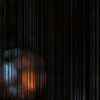 This Norwegian duo made a big splash in certain circles with their 2005 debut Pale Ravine, but their haunted, shadowy chamber drone held somewhat limited appeal for me.  While accomplished and unique, it was simply too cinematic and oppressively dark: whenever it was on, I felt like I was either trapped in a very slow-moving and somberly brooding art film or attending a witch-burning (both feelings that I generally do not actively seek out).  On this, their long-awaited follow-up, Deaf Center’s sound has become a bit more substantial musically and a bit less narrow mood-wise.  Also, they toned down the bombast and recorded in an actual studio.  All of that tweaking has cumulatively resulted in a significantly more gratifying album.
This Norwegian duo made a big splash in certain circles with their 2005 debut Pale Ravine, but their haunted, shadowy chamber drone held somewhat limited appeal for me.  While accomplished and unique, it was simply too cinematic and oppressively dark: whenever it was on, I felt like I was either trapped in a very slow-moving and somberly brooding art film or attending a witch-burning (both feelings that I generally do not actively seek out).  On this, their long-awaited follow-up, Deaf Center’s sound has become a bit more substantial musically and a bit less narrow mood-wise.  Also, they toned down the bombast and recorded in an actual studio.  All of that tweaking has cumulatively resulted in a significantly more gratifying album.
Aside from its pronounced predisposition towards murkiness and misery, the main thing that differentiated Deaf Center's Pale Ravine from rest of the drone world was its somewhat unusual instrumentation: Otto Totland is a pianist and Erik Skodvin is a cellist.  Unfortunately, they did not capitalize on that asset nearly as much as they could have, opting to frequently employ synthesizers and losing a lot of texture and tone due to underproduction (though they certainly gained some mystery and ominousness in return).  Thankfully, Deaf Center have largely ditched the synths and made everything much clearer, more spacious, and organic-sounding.  In fact, the album even features a handful of rather naked solo pieces.  The best of the lot is Totland's brief and fragile "Time Spent," which could almost pass for a lost Erik Satie piece if it were not for the dark undercurrent and intentionally clashing notes.  Skodvin, for his part, definitely has more of a talent for evocative song titles: "Animal Sacrifice" captures him sawing away at his cello to produce a host of moaning and squealing harmonics.  Unfortunately, it lacks any sort of melodic framework to hold it all together, so it is not much more than a passing curiosity.
As much as I liked "Time Spent," there is no denying that Deaf Center are at their best when they are in full collaboration.  The best example of this, and the best thing they've ever actually recorded, is the slow-burning epic "The Day I Would Never Have," which deceptively begins with a gently melancholy piano motif.  Gradually, Skodvin's cello fades in with a glacially intensifying three-note progression and a quivering nimbus of feedback.  It is so simple, yet so perfect: the three notes keep relentlessly repeating while everything in the periphery grows steadily more dense, distorted, and snarling for nearly 9 minutes before it all abruptly drops out to make way for the piano's quiet return.  My other favorite piece is the opener, "Divided," which takes the tortured-sounding bow-squeals of "Animal Sacrifice" and puts them to much better use over a slow-moving wall of dense swells.
While it certainly has flashes of tenderness and fragility, Owl Splinters is still very much a dark album.  That darkness seems much more honest, earthy, and meaningful now, however, arising from primal cello ferocity rather than field recordings of crackling fires and murky minor key synth chords–I want to hear those strings scrape, strain, and stretch.  This album is undeniably a big step forward, but Otto and Erik still have some work to do in getting everything together in the right place and at the right time.  If these guys can find a way to more seamlessly blend Totland's impressive melodic talents to their newfound knack for roiling density and power, they might unleash an absolute monster of an album.  As it stands, Owl Splinters is merely an intermittently very good one.
(Note: The vinyl version of this album comes with a bonus disc of reinterpretations by Skodvin's Svarte Greiner project.  That seems fairly promising, but I have not heard it yet.)
Samples:
 
 
Read More


